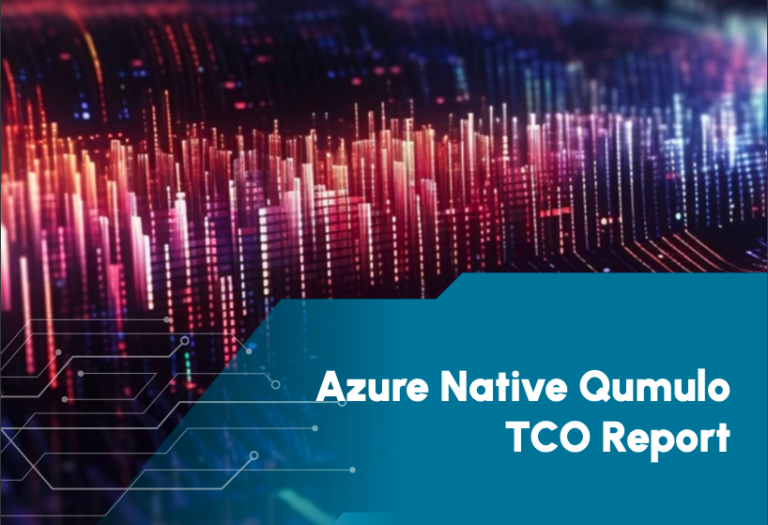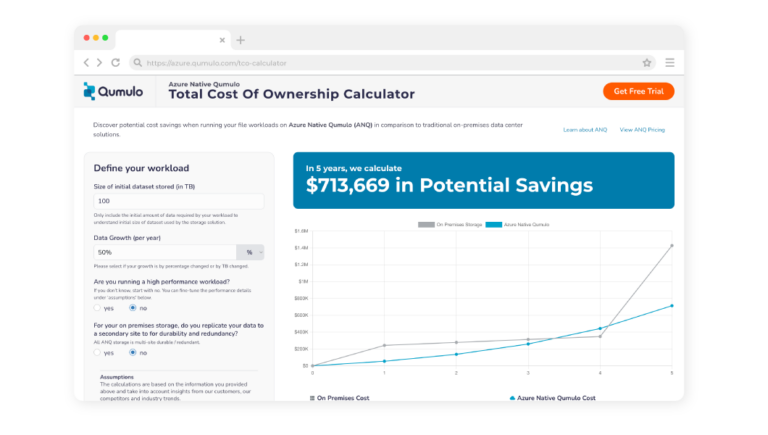Exabyte-scale file storage on Azure
Azure Native Qumulo Hot (ANQ Hot) is the only cloud-native file service that offers truly elastic capacity and throughput, as well as all the enterprise features of your on-premises NAS, and a TCO to match.
Exabyte-scale file storage on Azure
Azure Native Qumulo Hot is the only cloud-native file service that offers truly elastic capacity and throughput, as well as all the enterprise features of your on-premises NAS, and a TCO to match.
Future-proof your business with Azure Native Qumulo
Lift and shift any workload
Power new AI use cases
Scale to meet any need
Unchain your file-based workloads from the data center
Unbeatable Economics
- TCO for ANQ Hot is comparable or better on-premises NAS
- As low as $30 per TB per month billed only on consumption
Cloud-native Elasticity
- Scale from 100TB to 100EB and back down as needed
- Automatically scale capacity and performance independently as demands evolve
Enterprise-ready
- All the enterprise storage features that you expect from your on-prem NAS
- NFS, SMB, and object protocol support
Run any workload in the cloud with Azure Native Qumulo
| High-performance file storage | |
| Business Continuity and Disaster Recovery | |
| General File Share |

Run any workload in the cloud with Azure Native Qumulo
| High-performance file storage | |
| Business Continuity and Disaster Recovery | |
| General File Share |

Common Use Case Examples

Horizontal
Azure Virtual Desktop
Hybrid work is here to stay. And that means more devices in more locations need secure access to your data. For organizations looking to use Azure Virtual Desktop for their VDI solution, Azure Native Qumulo provides:
- Unconstrained scalability for AVD profile storage
- Elastic throughput that adjust dynamically as your user count grows
- The most cost-effective storage for large-scale VDI deployments

Healthcare
PACS VNA / EHR Blob storage
With healthcare data growing faster than any other industry, scaling storage solely in the data center will soon become overwhelming for health systems. ANQ Hot can help to:
- Reduce management overhead by consolidating from multiple storage platforms to one
- Accelerate research pipelines with cloud-native AI/ML tools
- Optimize TCO with a reduced data center footprint

Healthcare
PACS VNA / EHR Blob storage
- Reduce management overhead by consolidating from multiple storage platforms to one
- Accelerate research pipelines with cloud-native AI/ML tools
- Optimize TCO with a reduced data center footprint

Media and Entertainment
Video Editing / VFX / Rendering
Production pipelines and broadcast workflows are now globally distributed, making data creation, modification, and sharing across thousands of artists around the world increasingly challenging. ANQ Hot can be used to:
- Help globally-distributed production teams collaborate as efficiently as if they were sitting locally in the same studio
- Burst for edit and render workloads when headroom is low and timelines get tight

Energy, Oil and Gas
Subsurface modeling / Well optimization
Optimized well planning and subsurface modeling requires efficient cross-team collaboration and access to a large amount of distributed and ever-changing datasets. ANQ can help engineers:
- Accelerate drilling operations by sparing loss engineering time for reconciling on-prem storage silos and multiple data sources
- Enable global access to a consistent pool of baseline data where frequent iterations can be immediately reflected and made available across distributed teams

Energy, Oil and Gas
Subsurface modeling / Well optimization
Optimized well planning and subsurface modeling requires efficient cross-team collaboration and access to a large amount of distributed and ever-changing datasets. ANQ can help engineers:
- Accelerate drilling operations by sparing loss engineering time for reconciling on-prem storage silos and multiple data sources
- Enable global access to a consistent pool of baseline data where frequent iterations can be immediately reflected and made available across distributed teams

Life Sciences
Genomics Pipelines
Geo-distributed research teams need to sequence and analyze exabytes of genomic data that’s often created and stored in siloed data centers on prem. ANQ can help scientists and researchers:
- Accelerate time to discovery with a single, storage solution in the cloud that scales to meet any throughput and capacity needs on-demand
- Simplify storage for Next Gen Sequencing with a unified storage solution for hundreds of sequencers, compute farms, and researchers
- Enable unified, low-latency access to all your data, on-prem and in the cloud using Qumulo Global Namespace
Estimate your storage costs
Use our pricing calculator tool to estimate your storage costs using ANQ for your workloads.
Estimate your storage costs with ANQ Hot
Need long-term file storage storage in Azure? Learn more about Azure Native Qumulo Cold
Read TCO Report

The Futurum Group ran a comprehensive total-cost-of-ownership (TCO) analysis comparing ANQ Hot to a typical on-prem deployment. See the results.
Compare storage TCO

Find out how ANQ compares to the cost per terabyte of today’s most common scale-out NAS systems, using our own TCO calculator tool.






Expansive Regional Availability
Azure Native Qumulo can be provisioned directly from the Azure Portal in regions across the US, EU, UK, Asia and Canada.
America regions:
East US: Virginia
East US 2: Virginia
West US: California
West US 2: Washington
West US 3: Arizona
North Central US: Illinois
South Central US: Texas
Central US: Iowa
Brazil South: Sao Paulo State
EMEA & Canada regions:
France Central: Paris
Germany West Central: Frankfurt
North Europe: Ireland
Norway East: Oslo
Sweden Central: Gavle
Switzerland North: Zurich
West Europe: Netherlands
UK South: London
UK West: Cardiff
Canada Central: Toronto
Canada East: Quebec City
APAC regions:
Southeast Asia: Singapore
Australia East: New South Wales
Central India: Pune
Japan East: Tokyo, Saitama
Korean Central: Seoul
UAE North: Dubai
Ready to get started?
Frequently Asked Questions
Yes, some cloud-file options are built on object storage, but they offer limited support for advanced enterprise storage features like snapshots, replication, quota limits, or multiprotocol support. Only Azure Native Qumulo delivers the flexibility and economics of object storage while also giving you the full suite of enterprise storage features that you need in the cloud.
Many existing workloads that are built to use file data can’t just switch between file and object storage. They either need to continue using file data, or need to be completely refactored to use object data instead. Refactoring is a costly, risky effort, so most enterprises would rather continue using file storage even in the cloud. With Azure Native Qumulo, they now have that option.
The title refers to the fact that Azure Native Qumulo Hot is deployed as a native Azure service, directly from the Azure Portal. The service is billed monthly as part of your Azure subscription, and you pay only for the capacity you use.
Yes. Just delete the data that you don’t need. With Azure Native Qumulo’s cloud-native elasticity, you only pay for what you use.
Yes. Your Azure Native Qumulo service can deliver whatever throughput you need – anywhere from 1GBps to 100GBps. Whenever your workloads need more throughput, your ANQ service automatically adds bandwidth for as long as you need it.
Pricing is metered, per TB per month, with specific pricing tiered based on total consumption. If your total usage is between 100 and 499TB, the service will bill at $37 per TB per month. For 500 to 999TB of total usage, the cost is $33 per TB per month. Additional pricing tiers are available above 1PB of total consumption, or through Qumulo One.
Your Azure Native Qumulo monthly subscription includes 1GBps of throughput. If your workload demands exceed 1GBps, each additional 1GBps is billed at a rate of $0.00011 per GBps per TB stored, per minute.
Azure Native Qumulo Hot is available in select regions in North America, Europe. As ANQ Hot becomes available in additional Azure regions, the list on this page will be updated.
Yes, customers who consume Azure on a CSP subscription can subscribe to ANQ. The CSP subscribes to ANQ via Marketplace and invoices the customer. Customers who have a CSP but do not consume Azure on a CSP subscription can subscribe to ANQ directly. When a CSP subscribes to ANQ, Qumulo can offer the CSP margin via Marketplace. When a customer subscribes directly, Qumulo can offer our partner a finder’s fee. Later in 2023, Qumulo anticipates being able to replace the finder’s fee with margin via Multiparty Private Offer (MPO).
At launch in April 2021, Qumulo on Azure used VNet Peering to connect the customer’s Azure Virtual Network (VNet) to the file system. This allowed full bi-directional network communication between a customer’s workloads and the file system. VNet Peering required the customer administrator and Qumulo SRE team to manually connect these networks and coordinate IP ranges. VNet Peering does not support Network Security Groups (NSG) and traffic is billed for on both sides of the peered connection.
VNet Injection eliminates the requirement for VNet Peering. It creates network resources (virtual NICs) that customers can manage. For example, they can use an NSG that limits access to specific ports and protocols. These network resources are automatically provisioned upon ANQ subscription and destroyed upon termination of the subscription. All VNet Peering charges are eliminated and NSGs are now supported.
ANQ is available in all nine US public regions: East US, East US 2, West US, West US 2, West US 3, North Central US, West Central US, South Central US, and Central US. ANQ will be available outside of the US in 11 regions across the EU, UK, and Canada starting on July 31: France Central, Germany West Central, North Europe, Norway East, Sweden Central, Switzerland North, UK South, UK West, West Europe, Canada Central, and Canada East.
Customers can also specify the Availability Zone associated with the region where their Qumulo will be placed, which will decrease latency, increase availability, and eliminate cross-zone networking charges when Microsoft introduces these charges in July 2023.
Customers can add capacity to their initial configuration by contacting their Qumulo sales or customer success representative through email, phone, or Slack. Customers cannot make changes to region, availability zone, or storage class (Standard or Performance) after provisioning. These types of changes will require a migration of data to a new ANQ instance.
Azure Native Qumulo Scalable File Service Public Preview systems is covered by the Qumulo SaaS Service Level Agreement.
Please see the Qumulo Terms Hub for more information.

